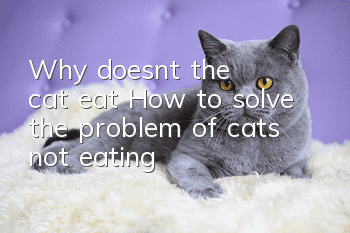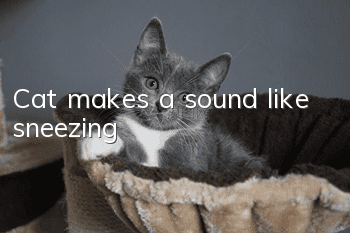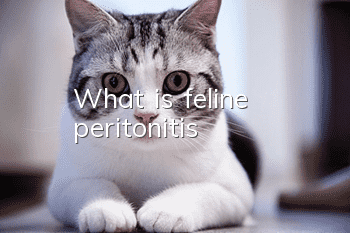Why doesn't the cat eat? How to solve the problem of cats not eating?

It is common for a cat to suddenly decide that he no longer wants to eat a certain cat food. But sometimes cats stop eating for other serious reasons. Then, we should consider whether there are other reasons why cats don’t eat? How can you help your cat regain its appetite?
Why is it a problem for cats not to eat?
If your cat is not feeling well, he may not eat because something is stuck in his stomach or intestines. Or, the cat may simply not like the food you offer. It could also be an illness that causes pain or discomfort. Whatever the reason, if your cat stops eating, it's a problem. If you have an obese cat who stops eating, hepatic lipidosis will quickly develop after a few days without eating. The disease, commonly known as fatty liver disease or fatty liver syndrome, can be fatal if left untreated. This is the main reason why it is so important to ensure that your overweight cat is eating properly. With fatty liver disease, the liver becomes overwhelmed trying to convert fat into energy. This condition is exacerbated by excess fat stored around your cat's liver. The liver is an important organ, and if it cannot work efficiently, the cat's health will be in serious trouble.
Health problems that cause cats not to eat
1. Respiratory system diseases
Respiratory problems can affect a cat's sense of smell or ability to breathe and cause a loss of appetite. Upper respiratory disease may block a cat's nose and eyes, causing temporary loss or limitation of vision and smell. Lower respiratory tract disease may affect your cat's lungs, making it difficult to breathe. These respiratory problems may be solved with some simple antibiotics, or they may be as complex as cancer. No matter how severe the respiratory problem is, if the illness prevents your cat from smelling food, it may cause your cat to not eat.
2. Digestive system diseases
Problems with your cat's stomach, intestines, pancreas, or other digestive system may cause her to stop eating. Vomiting, diarrhea, or abdominal pain may also accompany digestive problems. But often, a loss of appetite will be one of the first signs of digestive problems. Problems include acid reflux, tumors, intestinal bacterial imbalances, parasites, irritable bowel disease and other issues.
3. There is foreign matter in the cat’s stomach or intestines
Some cats like to eat things they shouldn't, possibly because they have something stuck in their stomach or intestines. If a foreign object gets stuck in your cat's stomach or intestines, it's called an obstruction. The blockage will not allow food to pass through the digestive tract, so the cat may vomit and then most likely stop eating. Some foreign objects can pass through the cat's system, causing only some vomiting and diarrhea, but also a lack of appetite.
4. The cat has dental disease
Diseased or painful teeth and gums can cause your cat to stop eating. Cats can break teeth, develop resorptive lesions on their teeth, inflame their gums, develop dental abscesses, and experience other dental problems that cause oral pain. Just like people, your cat may not want to eat if his mouth hurts. However, dental problems in cats can be difficult to diagnose, and your cat may need to be sedated or anesthetized to assess the problem.
Food problems that cause cats to stop eating
5. Food flavors
Cats are special. Some people eat a certain flavor of food for months or years and then suddenly decide not to eat it anymore. But sometimes food manufacturers change flavors and ingredients without any obvious markings on the bags.
6. Shape or texture of cat food
Cats can also be sensitive to certain shapes and textures when it comes to cat food. Some cats like triangles, some like circles, and some only eat crunchy dry food or canned wet food.
7. Cat food goes bad
If you give your cat expired or spoiled food, he may not want to eat it. Check the expiration date of food. Or, at least, smell it to see if it smells rancid.
Change cat food immediately
If the cat has stopped eating its normal food, see if a specific cat food is causing it. Sometimes cats can sense something is wrong with their food and won't eat it.
How to get your cat to eat
Depending on why your cat stopped eating, you can coax the kitten to start eating again. However, the quickest way to find out if there is a medical cause is to check it out at your local pet hospital. If an upper respiratory illness causes your cat to be congested and unable to smell his food, help your cat clear his nasal passages. Take your cat to a steamy bathroom or, if available, put some salt water in his nostrils. This helps the cat breathe easier and allows it to smell its food again.
Adjust your cat's wet food to induce it to eat again. Try heating wet cat food or tuna in the microwave for a few seconds. Alternatively, offer canned cat food, canned tuna, or canned chicken to stimulate your cat's appetite.
Feed your cat by choosing foods with different flavors, textures or shapes.
Change cat food from scratch. Cats may prefer recipes prepared at home with fresh ingredients.
Check to see if the formula or ingredients of the cat food your cat has been eating have recently changed. This information may be listed on the packaging as "New and Improved Flavors." Alternatively, contact the food company and ask. You may need to find a new favorite for your catgrain.
- Why do cats like to stay in pens?
- Why can pet cats climb high?
- The cat keeps panting and has shortness of breath.
- What do cats need to prepare for giving birth?
- What causes cats to fart?
- How to train Bengal cats? What are your opinions?
- Why does a cat's hind legs feel weak and cramped?
- How to buy a pure Persian cat? How to buy a pure Persian cat!
- Why can’t cats eat protein?
- Why doesn't the cat poop?



